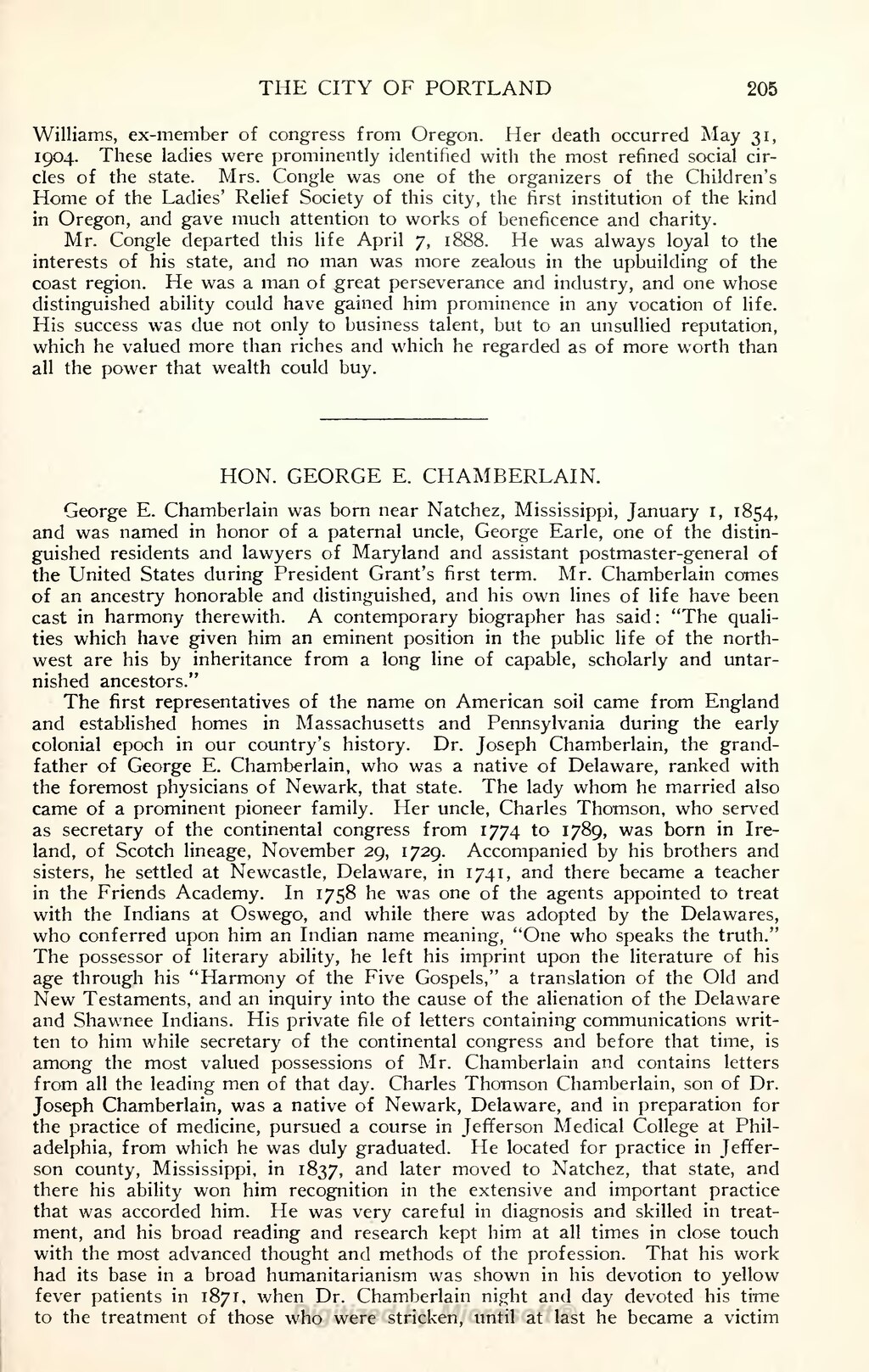Williams, ex-member of congress from Oregon. Her death occurred May 31, 1904. These ladies were prominently identified with the most refined social circles of the state. Mrs. Congle was one of the organizers of the Children's Home of the Ladies' Relief Society of this city, the first institution of the kind in Oregon, and gave much attention to works of beneficence and charity.
Mr. Congle departed this life April 7, 1888. He was always loyal to the interests of his state, and no man was more zealous in the upbuilding of the coast region. He was a man of great perseverance and industry, and one whose distinguished ability could have gained him prominence in any vocation of life. His success was due not only to business talent, but to an unsullied reputation, which he valued more than riches and which he regarded as of more worth than all the power that wealth could buy.
HON. GEORGE E. CHAMBERLAIN.
George E. Chamberlain was born near Natchez, Mississippi, January i, 1854, and was named in honor of a paternal uncle, George Earle, one of the distinguished residents and lawyers of Maryland and assistant postmaster-general of the United States during President Grant's first term. Mr. Chamberlain comes of an ancestry honorable and distinguished, and his own lines of life have been cast in harmony therewith. A contemporary biographer has said: "The qualities which have given him an eminent position in the public life of the northwest are his by inheritance from a long line of capable, scholarly and untarnished ancestors."
The first representatives of the name on American soil came from England and established homes in Massachusetts and Pennsylvania during the early colonial epoch in our country's history. Dr. Joseph Chamberlain, the grandfather of George E. Chamberlain, who was a native of Delaware, ranked with the foremost physicians of Newark, that state. The lady whom he married also came of a prominent pioneer family. Her uncle, Charles Thomson, who served as secretary of the continental congress from 1774 to 1789, was born in Ireland, of Scotch lineage, November 29, 1729. Accompanied by his brothers and sisters, he settled at Newcastle, Delaware, in 1741, and there became a teacher in the Friends Academy. In 1758 he was one of the agents appointed to treat with the Indians at Oswego, and while there was adopted by the Delawares, who conferred upon him an Indian name meaning, "One who speaks the truth." The possessor of literary ability, he left his imprint upon the literature of his age through his "Harmony of the Five Gospels," a translation of the Old and New Testaments, and an inquiry into the cause of the alienation of the Delaware and Shawnee Indians. His private file of letters containing communications written to him while secretary of the continental congress and before that time, is among the most valued possessions of Mr. Chamberlain and contains letters from all the leading men of that day. Charles Thomson Chamberlain, son of Dr. Joseph Chamberlain, was a native of Newark, Delaware, and in preparation for the practice of medicine, pursued a course in Jefferson Medical College at Philadelphia, from which he was duly graduated. He located for practice in Jefiferson county, Mississippi, in 1837, and later moved to Natchez, that state, and there his ability won him recognition in the extensive and important practice that was accorded him. He was very careful in diagnosis and skilled in treatment, and his broad reading and research kept him at all times in close touch with the most advanced thought and methods of the profession. That his work had its base in a broad humanitarianism was shown in his devotion to yellow fever patients in 1871. when Dr. Chamberlain night and day devoted his time to the treatment of those who were stricken, until at last he became a victim
